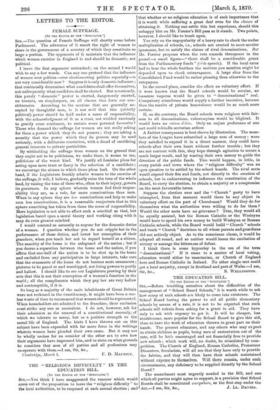THE "RELIGIOUS DIFFICULTY" IN THE EDUCATION BILL
(TO THE EDITOR OF THE "SPECTATOR."] SIR,—You think I have exaggerated the rancour which would come out of the proposition to leave the "religious difficulty" to the local authorities, to be reopened at each annual election ; and
that whether or no religious education is of such importance that it is worth while suffering a great deal even for the chance of obtaining it. Nothing can settle this but experience, should this unhappy blot on Mr. Forster's Bill pass as it stands. Two points, however, I should like to touch upon.
You rely on the unpopularity of a heavy rate to check the undue multiplication of schools, i.e., schools not erected to meet secular ignorance, but to satisfy the claims of rival denominations. But Mr. Forster proposes when the rate exceeds threepence in the pound—a small figure—" there shall be a considerable grant from the Parliamentary funds" (ride speech). If the local rates had to bear the whole burthen the motives you mention might be depended upon to check extravagance. A large slice from the Consolidated Fund would be rather pleasing than otherwise to the ratepayers.
In the second place, consider the effect on voluntary effort. If it were known that the Board schools would be secular, an immense impetus would be given to " denominational" zeal. Compulsory attendance would supply a further incentive, because then the results of private benevolence would be so much more certain.
If, on the contrary, the Board schools were religious with fair- ness to all denominations, voluutaryism would be blighted. It would have no raison d'être. Only an unjust preference of one sect could rekindle sectarian ardour.
A further consequence is best shown by illustration. The mem- bers of the League have subscribed a large sum of money ; were they satisfied to expend it in a direct manner, they could have schools after their own heart without further trouble ; but they are not content with this, they hope through agitation to secure a much larger result, and by wasting their own money to guide the direction of the public funds. This would happen, in little, in every parish and town where the "religious difficulty" was an open question to be settled by the school boards. The rival sects would expend their fire and funds, not directly in the erection of schools, but in endeavouring to influence the constitution of the Board, to carry the election, to obtain a majority or a compromise on the most favourable terms.
Suppose the election over and the "Church" party to have triumphed, from that moment would there be any object in voluntary effort on the part of Churchmen? Would they do for themselves what the authorities were willing to do for them ? Would the other sects have no grievance ? True, they would all be equally assisted, but the Roman Catholic or the Wesleyan would have to spend his own money to build Wesleyan or Roman Catholic schools, while the Board would build " Church " schools and teach " Church" doctrines to all whose parents and guardians did not actively object. As to the conscience clause, it would be adopted all round, and so neither would lessen the exultation of victory or assuage the bitterness of defeat.
I think there is some hypocrisy in the use of the term "denominational." If it came to a matter of local voting, education would either be unsectarian, or Church of England here and Roman Catholic in Ireland. No other single sect could get a local majority, except in Scotland and part of Wales.—I am,


































 Previous page
Previous page